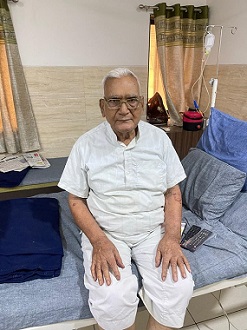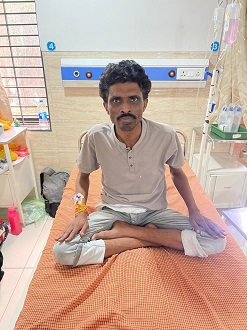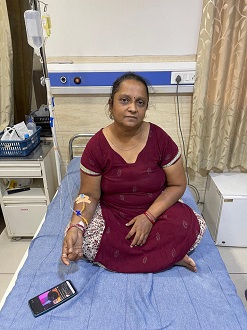Case 1
Management of Severe Asthma Exacerbation
Patient Profile
- Name : Mr.Govind Shah
- Age : 83
- Gender : Male
- Medical History: Known case of Asthma, Hypertension, and Allergic Rhinitis for the last 8-10 years.
- Allergies: Cold atmosphere and humid climate.
- Previous Medications: Inhalers and other supportive treatments.

Clinical Presentation
Mr. Govind Shah, an 83-year-old male, was admitted with complaints of breathlessness and cough with expectoration. His medical history indicated a long-standing battle with asthma and hypertension, along with allergic rhinitis. Over the years, he managed his asthma with inhalers and supportive treatments, but then he experienced significant discomfort and exacerbations triggered by cold and humid environments.
Initial Assessment and Diagnosis
Upon admission, a thorough examination and pulmonary function test (PFT) showed severe obstruction in the airways. This was consistent with his other symptoms of breathlessness and productive cough.
Treatment Plan
Given the severity of his condition, the following treatment plan was implemented:
- Nebulization: The administration of nebulizers was provided immediately to relieve bronchoconstriction.
- Steroids: Intravenous steroids were given to reduce inflammation and control the acute exacerbation
- Anti-Allergic Medications: Anti-allergic medications were given to manage allergic rhinitis and prevent further triggers.
Progress and Outcome
Mr. Shah responded well to the aggressive management of his asthma exacerbation. Gradual improvement was noted with the combined use of nebulizers and steroids. His breathing stabilized, and the frequency of coughing reduced significantly.
After close monitoring and treatment in the hospital, Mr. Shah was allowed to be discharged. He was prescribed a regimen to continue at home, which included:
- Nebulizers for ongoing management of asthma symptoms.
- Anti-allergic medications to prevent future allergic reactions and exacerbations.
Follow-Up Care
A follow-up plan was established to ensure Mr. Shah's condition remained stable and to monitor his response to continued treatment. He was advised to avoid known triggers, such as cold and humid environments, and to adhere strictly to his medication regimen.
Conclusion
Mr. Govind Shah's case underscores the importance of timely and effective management of severe asthma exacerbations, particularly in elderly patients with multiple comorbidities. The coordinated care involving nebulizers, steroids, and anti-allergic treatments facilitated his recovery and provided a framework for ongoing management to prevent future exacerbations.
Case 2
Management of Drug-Resistant Tuberculosis
Patient Profile
- Name : Mr. Govind Dodava
- Age : 40
- Gender : Male
- Medical History: Known case of old pulmonary Koch's (tuberculosis).
- Presenting Complaints: Hemoptysis (coughing up blood) and fever

Clinical Presentation
Mr. Govind Dodava, a 40-year-old male, was admitted with complaints of hemoptysis and fever. His medical history showed a past diagnosis of pulmonary Kochs (tuberculosis). Despite treatment for his initial TB infection, Mr. Dodava experienced recurring symptoms, due to which further investigations were carried.
Initial Assessment and Diagnosis
Upon admission, a CT scan was performed, which showed a cavitary lesion in the right upper lobe of the lung. Due to the lack of expectoration, a bronchoscopy with bronchoalveolar lavage (BAL) was conducted. The BAL analysis indicated the presence of Mycobacterium tuberculosis. Additionally, the GeneXpert test detected an MTB complex with rifampicin resistance, confirming a diagnosis of drug-resistant tuberculosis.
Treatment Plan
- Second-Line Anti-Tubercular Treatment: Initiation of second-line anti-tubercular medications to address the rifampicin-resistant strain of TB.
Progress and Outcome
Mr. Dodava responded well to the initiation of second-line anti-tubercular treatment. His symptoms of hemoptysis and fever gradually subsided with consistent medication adherence. Regular monitoring of his condition, including follow-up imaging and laboratory tests, showed a reduction in the size of the cavitary lesion and an overall improvement in his clinical status.
Follow-Up Care
A follow-up plan was established to ensure Mr. Dodava's continued recovery and to monitor his response to the second-line treatment regimen. He was advised to:
- Adhere strictly to the prescribed medication regimen.
- Attend regular follow-up appointments for clinical assessment and monitoring of treatment progress.
- Avoid known triggers and maintain a healthy lifestyle to support his immune system.
Conclusion
Mr. Govind Dodava's case highlights the challenges and complexities of managing drug-resistant tuberculosis. Coordinated care with advanced diagnostics and second-line anti-tubercular medications facilitated his recovery. This case underscores the importance of timely diagnosis and appropriate treatment in managing drug-resistant TB to prevent complications and ensure positive patient outcomes.
Case 3
Management of Acute Gastritis in a Patient with Asthma and Anxiety Disorder
Patient Profile
- Name : Mrs. Rachana Mehta
- Age : 45
- Gender : Female
- Medical History: Known case of Asthma and Anxiety Disorder
- Presenting Complaints: Severe epigastric and upper abdominal pain

Clinical Presentation
Mrs. Rachana Mehta, a 45-year-old female, presented with severe epigastric and upper abdominal pain. She has a known medical history of asthma and anxiety disorder, for which she is on regular treatment. Despite her chronic conditions, she had been managing her health well until the onset of these acute symptoms.
Initial Assessment and Diagnosis
An ultrasound (USG) was performed upon presentation, which returned normal results. Given the severity of her symptoms, initial treatment included proton pump inhibitors (PPI) and oral Digene liquid to manage her gastrointestinal discomfort. However, these interventions did not provide relief, prompting further investigation.
Mrs. Mehta was admitted to Care Superspeciality Hospital for comprehensive evaluation and treatment. An upper gastrointestinal (GI) endoscopy was performed, revealing acute gastritis as the underlying cause of her severe abdominal pain.
Treatment Plan
Given the diagnosis of acute gastritis, the following treatment plan was implemented:
- PPI Infusion: Continuous infusion of proton pump inhibitors was given to reduce stomach acid and promote healing of the gastric mucosa.
- Supportive Treatment: Additional supportive treatments were given to relieve symptoms.
Progress and Outcome
The patient, Mrs. Mehta, responded positively to the treatment regimen. The continuous PPI infusion, along with other supportive measures, which showed a gradual improvement in her symptoms. Her epigastric and upper abdominal pain decreased significantly, and she felt much better.
After proper monitoring and consistent improvement, Mrs. Mehta was declared stable and was ready for discharge. She was provided with a comprehensive discharge plan, which included:
- Continued PPI Therapy: Oral PPIs to continue the management of gastritis and prevent recurrence.
- Dietary Modifications: Recommendations for a gastritis-friendly diet to avoid stomach lining irritation.
- Follow-Up Appointments: Scheduled follow-ups to monitor her recovery and adjust treatment as necessary.
Conclusion
Mrs. Rachana Mehta's case highlights the importance of thorough diagnostic evaluation in patients with complex medical histories. Despite her chronic conditions of asthma and anxiety disorder, the timely diagnosis and effective management of acute gastritis led to her successful recovery.